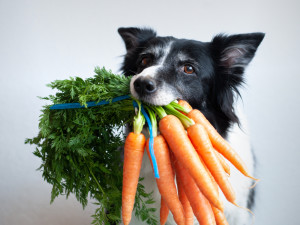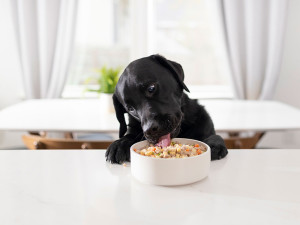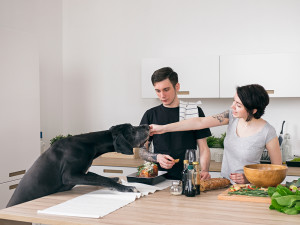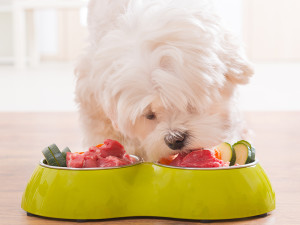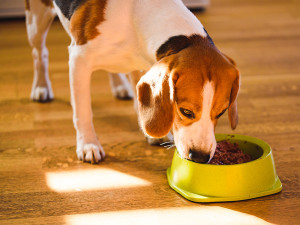Let Your Dog Lap Up Your Bone Broth
It isn’t just a healthy cocktail for the likes of Gwyneth Paltrow and Kylie Jenner. And we’ve got a recipe.
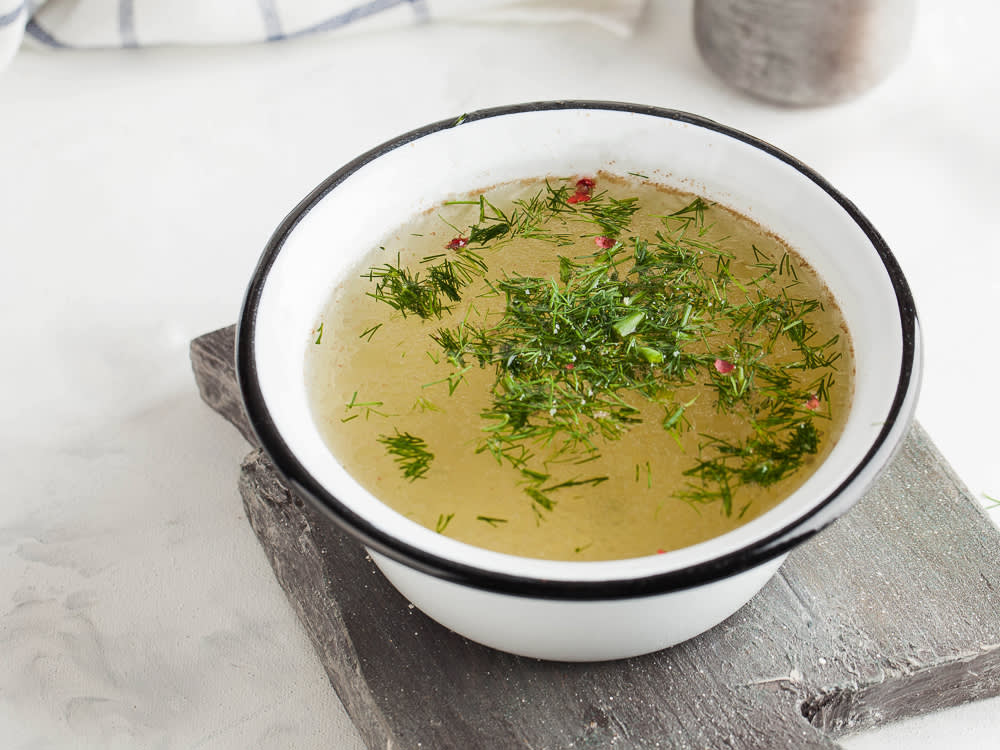
Share Article
Bone broth is all the rage these days — whether you’re simmering your own at home or buying your own “brodo” online, humans can’t slurp up enough for its purported health benefits. “It is a strong rejuvenating potion high in minerals, amino acids, glucosamine and many more valuable nutrients,” says veterinarian Dr. Judy Morgan. “It can be served alone or mixed with meals.” She also notes that bone broth can be used to cook grains and vegetables, or rehydrate freeze-dried food.
What is Bone Broth?
So what’s is this all-powerful bone broth made of, exactly? Bone broth is a mineral-rich stock made by boiling bones along with (dog-friendly) herbs and spices for over a day. This makes it a nutrient-dense, extremely easy, tasty superfood for dogsopens in a new tab.

littleKin™ is Kinship’s home just for puppy and kitten parents. Bop over to check out expert advice, new pet tools, and special deals—all curated for your newest family member.
opens in a new tabWhat is the difference between bone broth and stock? Bone broth is cooked for a much longer time than stock (over a day as per the recipe below), either on the stove, in a slow cooker or an instant pot, to extract as much of the healthful collagen and minerals from the bones and connective tissues as possible. In bone broth, the bones should crumble at the end of the cooking process. Stock, on the other hand, cooks only for around 2 to 4 hours on the stove. If you want to speed up your bone broth cooking, you can cook it in 4 1/2 hours or so with an instant pot.
Benefits of Bone Broth for Dogs
Bone broth is incredibly healthy and filled to the brim with crucial nutrients that dogs need. Each serving of bone broth is loaded with easily absorbable, hydrating nutrients that provide the necessary building blocks to boost your dog’s overall health. A practitioner of Traditional Chinese Medicine, which relies on the healing powers of whole foods, Dr. Morgan provides a thorough guide on how to apply these principles to benefit your dog’s health in her book, Yin & Yang Nutrition for Dogs. The nutritional figures will vary depending on which kind of bone you use (turkey, beef, pork), whether it’s a marrow bone, and what other vegetables you add to the mix (providing vitamins and minerals).
Supports Joints
“When we have animals with joint problems, we want to get a lot of extra collagens to their diet, [primalvore bone broth] is a great way to do that,” says Dr. Morgan. That’s because bone broth has glucosamine and chondroitin sulfate, which may help to fight inflammation in a dog’s joints. Hyaluronic acid, another nutrient in bone broth, helps cushion and preserve collagen in the joints.
Strengthens Bones
Rich in amino acids, bone broth may help your pup strengthen their muscles and bones. An essential part of bone structure is the protein collagen which forms fibrous networks to keep bones flexible. The collagen found in animal bones breaks down during the cooking process of bone broth to create gelatin. Both collagen and gelatin provide pups with ample protein and amino acids (proline and glycine), which the body uses to produce more collagen to keep their bones strong.
Improves Gut Health
Glutamine, another important amino acid, may help to prevent a gut imbalance known as intestinal dysbiosis in petsopens in a new tab or leaky gut. Glutamine helps strengthen the intestinal lining and reduces irritation. During stress (due to lifestyle or illness), bone broth, veggies, and supplements are a great way to boost this.
Keeps Pups Hydrated
For dogs experiencing digestive issues like diarrhea, vets often recommend a fast followed by a bland diet to allow the stomach to recover. Bone broth is great when they’re on the rebound because it’s hydrating, gentle on the stomach, and packed with those essential nutrients.
Make Bone Broth at Home
This bone broth recipe is a great addition to your dog’s current diet. Not only does bone broth encourage a healthy gut — improving your dog’s digestion — it also strengthens joints and reinforces your dog’s immune system. Bone broth is full of important nutrients and mineralsopens in a new tab (like magnesium, calcium, phosphorus, collagen, and gelatin) that pups need. Only give your dog homemade bone broth or bone broth specifically formulated for pups — bone broth for humans may contain high quantities of potential toxins, such as onions and garlic that your dog should not eatopens in a new tab. Here’s how to make your own at home:
How To Serve and Store Bone Broth
Once the bone broth is ready, any added vegetables and meat strained from the broth can be added to meals as toppersopens in a new tab. Important: never feed cooked bones to dogsopens in a new tab.
Bone broth can be stored in an air-tight container in the refrigerator for up to one week and frozen up to 12 months. We recommend freezing in ice cube trays, which is a great way to have single servings readily available. Just warm the frozen stock up before feeding to your pup.
How much bone broth should you feed your dog?
As with any new foods, introduce the bone broth slowly to assess your dog’s reaction and work your way up, adding more as needed. Dr. Morgan says for her own small dogs (15-30 pounds), she adds a couple tablespoons to each meal to warm up her dog’s food from the fridge. If your own dog enjoys it and shows no adverse reaction, then you can increase the amount depending on the size of your dog, up to six ounces per day (for large breed dogs).
Chicken Bone Broth Pupsicle Recipe
If you’re looking for a way to help your dog cool off when temperatures soar, a bone broth pupsicle will make your dog go wild. With all the same amazing nutrients as warm bone broth, this cooling summer chicken bone broth ice treat is a healthy way for dogs to beat the heat.
Make chicken bone broth (as directed above)
Remove bone from broth and grind in a food processor until fine.
Return the bones to the broth and mix.
Pour bone and broth mixture into a silicon mold and freeze.

Claudia Kawczynska
Claudia Kawczynska was co-founder and editor-in-chief of The Bark for 20 years. She also edited the best-selling anthology Dog Is My Co-Pilot.
Related articles
![a black dog eats from a white bowl]() opens in a new tab
opens in a new tab8 Best Fresh Food Delivery Services For Dogs
Feeding your dog healthy whole foods is easier than ever.
![pet parents making homemade dog food cheaper for black dog climbing on counter]() opens in a new tab
opens in a new tabIs Cooking Your Dog’s Food Worth it?
A nutritionist on dogs’ unique dietary needs, important ingredients, and other pro tips for home-cooked dog food.
![Various Veggie Chips in a Ceramic Blue Bowl]() opens in a new tab
opens in a new tabCan Dogs Eat Sweet Potatoes?
Add it to the list of healthy human superfoods pups can eat, too.
![White terrier eating fresh dog food]() opens in a new tab
opens in a new tabThe Scoop on Human-Grade Dog Food
For starters, yes, it’s good enough to eat.
![Beagle eating food out of a dog bowl]() opens in a new tab
opens in a new tabSupplements Are Going to the Dogs
An integrative vet helps suss out what’s beneficial versus what’s bogus.
![Cheerful Brunette Having Fun With Her Dog Outside]() opens in a new tab
opens in a new tabBig Fish: The Best Omega-3 Supplements for Dogs (And Why They Need Them)
Fatty acids rev up your dog’s energy, keep their coat shiny, help with inflammation from allergies and arthritis, and so much more.

